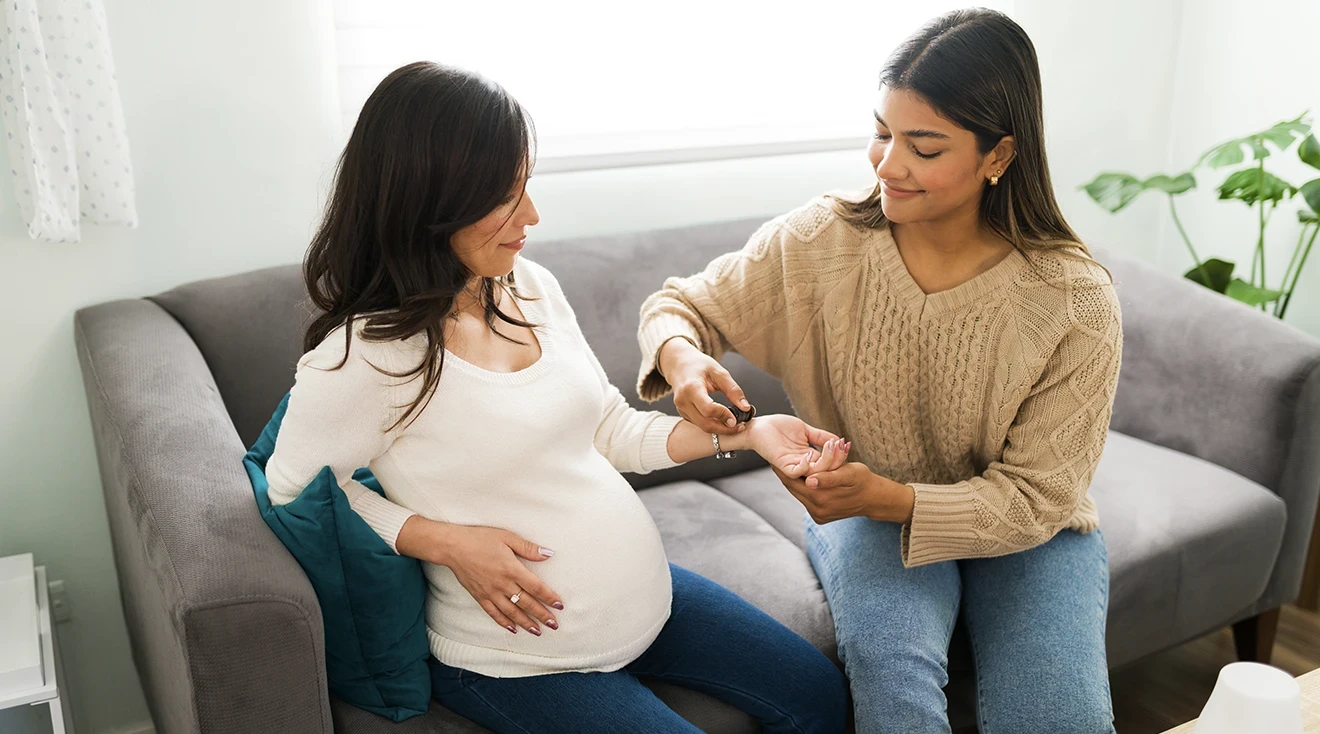What You Need to Know About Essential Oils for Pregnancy
Essential oils have been steadily increasing in popularity over recent years. So if you’ve ever come across them while browsing a cool lifestyle blog, you’re likely not alone. You might have even wondered if aromatherapy starter kits and essential oils are something you could use—after all, your pregnant self is feeling pretty exhausted and nauseated these days.
We don’t blame you for thinking about giving essential oils for pregnancy a try. But before you take out your credit card and place an order, do some research. While aromatherapy can, in some cases, be helpful, the science is mixed, the quality of products varies greatly and certain oils are potentially harmful for pregnant women. For the safest, most effective essential oil experience, read on.
The term “essential oil” is actually derived from “quintessential oil,” which, in turn, comes from Aristotle’s notion that while fire, air, earth and water make up natural materials, it’s the fifth element, aka quintessence, that gives a certain material its “life force.”
Of course, now we know that essential oils—which are sourced from plants, flowers and seeds—are in fact made up of a combination of chemicals and can be isolated via distillation or a mechanical process. Thanks to their volatile compounds, essential oils are fragrant and therefore used in aromatherapy, which can be thought of as “plant medicine,” says Amy Galper, executive director and founder of the New York Institute of Aromatherapy in New York City. “Aromatherapy understands that our sense of smell is deeply connected to the overall health and wellness of our whole being.”
Essential oils for pregnancy or any other situation aren’t meant to be ingested. Rather, they’re inhaled or diluted into a solution and used topically, whether it’s a spot treatment or bath soak. “When used as a topical application, massage oils or other skin-care products are absorbed through the skin. When used through inhalation, the molecules move from the nose or mouth to the lungs, brain and other parts of the body,” explains Nita Landry, MD, an ob-gyn who is a recurring cohost on the syndicated show The Doctors.
Once inside the nasal cavity, the molecules send chemical messages to the part of the brain that affects emotions. “When we experience a scent, it triggers all sorts of responses in our body that affect our well-being,” Galper says. “That’s why smelling something delicious can make us hungry or smelling something sexy can get us in the mood. When we’re feeling ill or uncomfortable, our stress response is triggered, and aroma can be a profound tool to help rewire the way we respond to stress.”
Since many medications are off-limits when you’re expecting, using certain essential oils during pregnancy can be a great alternative for treating illness and uncomfortable symptoms, and that’s exactly why they’re becoming more popular with pregnant women. “Essential oils are natural remedies with very few side effects,” says Lakeisha W. Richardson, MD, an ob-gyn at Delta Regional Hospital in Greenville, Mississippi. “More and more patients are trying to use alternative ways to handle illnesses due to the large side-effect profile of most medications.” (Richardson’s favorite essential oil is lavender, which she uses to fall asleep.)
It depends on whom you ask. Many doctors won’t recommend aromatherapy because of the lack of randomized controlled studies proving it’s an effective treatment during pregnancy for illness or discomfort. “The use of essential oils for pregnancy is controversial, and the amount of research we have on the subject is limited,” Landry says.
Making matters worse, depending on what the product claims to do, it may not even be regulated by the Food and Drug Administration, so the strength and composition can vary greatly. Landry also points out that essential oils can interact with conventional drugs. In addition, as the International Federation of Professional Aromatherapists notes in its Pregnancy Guidelines, “essential oils by their very nature, being organic substances, will cross the placental barrier and have the potential to affect the fetus.”
That said, it’s not at all wise to use essential oils from a random blog or other lifestyle “expert.” Instead, ask your doctor if essential oils for pregnancy are right for you and, if so, if they have any recommendations for high-quality oils. In addition, essential oils for pregnancy are best used under the guidance of a qualified expert, whether it’s a physician, midwife or someone your health provider recommends.
Essential oils to avoid during pregnancy
Even if you’ve zeroed in on a set of essential oils you can trust, you should still proceed cautiously if you’re using them when pregnant. For example, if you’re allergic to certain ingredients, you shouldn’t use them in aromatherapy either, Galper says.
In addition, many essential oils are specifically harmful during pregnancy, either because they can cause complications (like uterine contractions) or because experts are just not sure about how they’d affect the pregnant mom or fetus. These include:
- Aniseed
- Basil (estragole CT)
- Birch
- Camphor
- Caraway
- Cinnamon
- Clary sage
- Fennel
- Hyssop
- Mugwort
- Parsley seed or leaf
- Pennyroyal
- Sage
- Tansy
- Tarragon
- Thuja
- Wintergreen
- Wormwood
With good essential oils and expert guidance, you may find that aromatherapy can make you feel a lot better. Galper makes the following recommendations for her patients, but again, check with your health provider before trying them on yourself.
-
To relieve nausea: Lavender, chamomile, peppermint and ginger. Sniff them directly from the bottle, or sniff a cotton ball or tissue treated with a drop or two. “They ease belly upset and are good essential oils for morning sickness,” Galper says.
-
To soothe muscle aches: Lavender, ylang-ylang, ginger, chamomile and frankincense. Add a total of 12 drops of essential oil to 2 tablespoons of a base oil, like jojoba or almond oil, Galper advises.
-
To treat hemorrhoids: Cypress, geranium and lavender. “These can soothe the swelling and irritation,” Galper says. Blend together all three essential oils (for a total of 8 drops altogether) and add the mix to 2 tablespoons of aloe vera gel; apply the concoction directly onto the affected area with a cotton ball or tissue.
-
To improve sleep: Lavender, ylang-ylang and mandarin. “Add a total of 12 drops of essential oil to 2 tablespoons of distilled water in a spray-mist bottle, and mist pillows before bed,” she says.
Please note: The Bump and the materials and information it contains are not intended to, and do not constitute, medical or other health advice or diagnosis and should not be used as such. You should always consult with a qualified physician or health professional about your specific circumstances.
Plus, more from The Bump:
Amy Galper is a certified aromatherapist and the founder of the New York Institute of Aromatherapy in New York City. She has over two decades of experience and is a member of Credo Beauty’s Clean Beauty Council. She received her certification from the East West School of Herbal and Aromatic Studies and National Association of Holistic Aromatherapy in 2001.
Nita Landry, MD, is an ob-gyn who is a recurring cohost on the syndicated and Emmy-winning show The Doctors. She received her medical degree from the University of South Alabama and completed her residency at the University of Louisville.
Lakeisha W. Richardson, MD, has been an ob-gyn at Delta Regional Hospital in Greenville, Mississippi since 2009. She earned her medical degree from the University of Tennessee Health Science Center College of Medicine and completed her residency at the University of Mississippi Medical Center.
Statista, Global Essential Oils Market Demand 2018-2025, February 2022
Taylor & Francis, Handbook of Essential Oils: Science, Technology, and Applications, August 2020
Journal of Food Science, Essential Oils: Extraction, Bioactivities, and Their Uses for Food Preservation, June 2014
Elsevier, Essential Oil Safety: A Guide for Health Care Professionals, Second Edition, 2014
International Journal of Molecular Sciences, Therapeutic Effect and Mechanisms of Essential Oils in Mood Disorders: Interaction Between the Nervous and Respiratory Systems, May 2021
Journal of Food Protection, A Review of Regulatory Standards and Advances in Essential Oils as Antimicrobials in Foods, February 2023
International Federation of Professional Aromatherapists, Pregnancy Guidelines, 2013
International Journal of Molecular Sciences, Maternal Reproductive Toxicity of Some Essential Oils and Their Constitutents, May 2021
Journal of Natural Sciences Research, The Effect of Aromatherapy Inhalation on Nausea and Vomitting in Early Pregnancy: A Pilot Randomized Control Trial, 2013
Molecular Medicine Reports, Chamomile: A herbal medicine of the past with bright future, November 2010
Pain Research and Treatment, The Effectiveness of Aromatherapy in Reducing Pain: A Systematic Review and Meta-Analysis, December 2016
Evidence Based Complementary and Alternative Medicine, Traditional Uses, Phytochemistry, and Bioactives of Cananga odorata (Ylang-Ylang), July 2015
Journal of Integrative Medicine, Effectivness of Myrtus communis in the Treatment of Hemorrhoids, September 2017
Pakistan Journal of Pharmaceutical Sciences, Investigation of Vasoactive Ion Content of Herbs Used in Hemorrhoid Treatment in Turkey, April 2009
University of North Carolina at Chapel Hill, Wild Geranium
Botanical Medicine for Women’s Health, The Postpartum, 2010
Sleep Foundation, The Best Essential Oils for Sleep, April 2022
Molecules, Effects of Tangerine Essential Oil on Brain Waves, Moods, and Sleep Onset Latency, October 2020
Learn how we ensure the accuracy of our content through our editorial and medical review process.
Navigate forward to interact with the calendar and select a date. Press the question mark key to get the keyboard shortcuts for changing dates.




















































